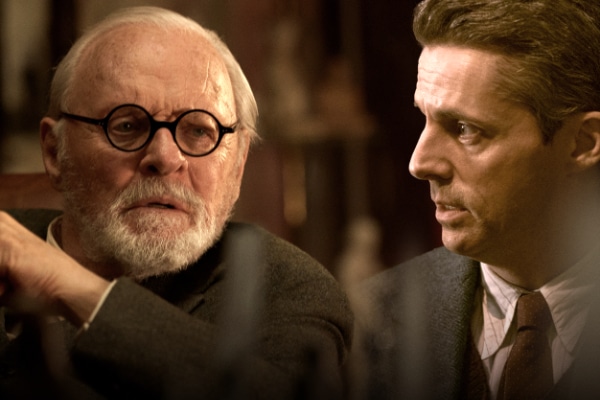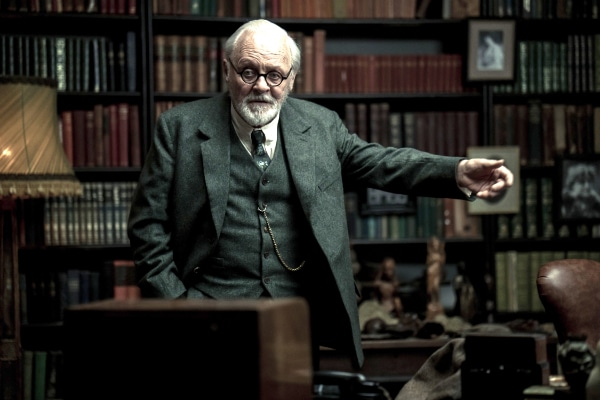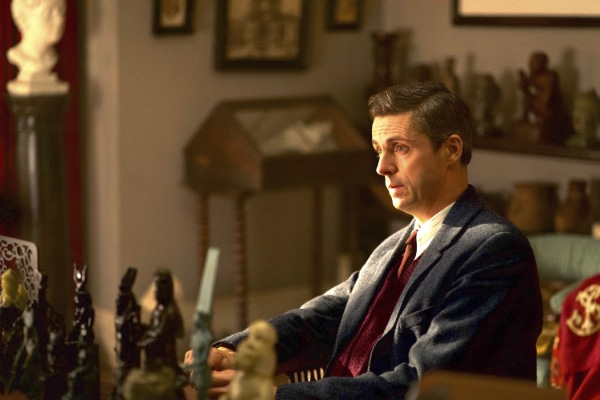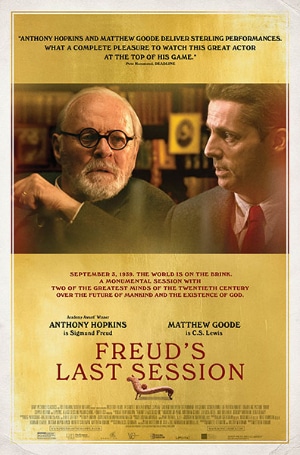There’s no proof that Sigmund Freud and C.S. Lewis ever met but we do know that Freud asked an Oxford don to visit him shortly before his death. That fact made playwright Mark St. Germain imagine that Lewis was the mysterious visitor. His off-Broadway play is now Freud’s Last Session starring Anthony Hopkins as Freud and Matthew Goode as C.S. Lewis.
The film takes place on September 3, 1939, two days after Hitler’s invasion of Poland. Lewis makes his way to Freud’s home, having been summoned by the famous psychoanalyst. Anna Freud (Liv Lisa Fries) can’t quite understand why her father has invited the Oxford don but she’s off to see to her own practice, a psychoanalyst in her own right.
The two intellectual giants get right into it with Freud commenting on Lewis’s recent work, The Pilgrim’s Regress. What follows is a conversation about the existence of God and the future of humanity. The film doesn’t take sides and one does not expect either Lewis or Freud to change their minds but the imagined exchange brings up almost every argument for or against the existence of God one has ever heard.

In between the exchange of ideas, there is some humor as well. Freud, suffering from mouth cancer and using significant amounts of morphine lies on his own “transformation couch,” as he calls it. There’s an amazing scene where Lewis and Freud take shelter in a church during a bombing raid and the doctor admires the stained glass windows as works of art. He surprises Lewis by knowing who St. Dymphna, patron saint of mental illness, is. He even has a statue of her among the knick-knacks in his study along with other mythical figures and Lewis teases him, “You have a Catholic Saint on your shelf!” Freud describes himself as a “passionate disbeliever obsessed with belief and worship.”

While Hopkins and Goode do a fantastic job of inhabiting their characters, the subplots of the film take away from the exchange between the two. There are flashbacks to both mens childhoods as well as Lewis’s service in the trenches during World War I. He suffers from PTSD as a result of his experience. There’s also a scene between Lewis and his good friend, J.R.R. Tolkien (Stephen Campbell Moore). Then there is Anna and her lesbian partner, Dorothy Burlingham (Jodi Balfour). Lewis even takes Freud’s dog, Jofi, out for a walk when another caller comes to visit. These interruptions fill out some back story but do not serve the narrative well.
As a believer watching the film, I was impressed that Lewis, realizing that Freud was nearing the end of his life, offered a listening ear to whatever Freud felt he needed to say. Lewis stated his beliefs and respectfully heard Freud’s position. The same cannot be said for Freud, who often got quite animated and yelled when putting forth his position.

Freud’s Last Session is thought-provoking and imaginative but misses the opportunity to go deeply into any of the arguments that are bandied about during the film. We live in a highly polarized society with serious divisions among people, especially when it comes to belief in God and the tenants of Christianity. We can learn from the film’s portray of C.S. Lewis as a patient listener. He embodied, as the saying goes, that “the truth needs no defense.” Instead, Lewis presents the truth to Freud and rather than arguing with him, listened with compassion and patience, giving Freud the outlet he needed as he contemplated his own end.
For a better film about the life of C.S. Lewis, see 1993’s Shadowlands where, ironically, Anthony Hopkins plays Lewis.



